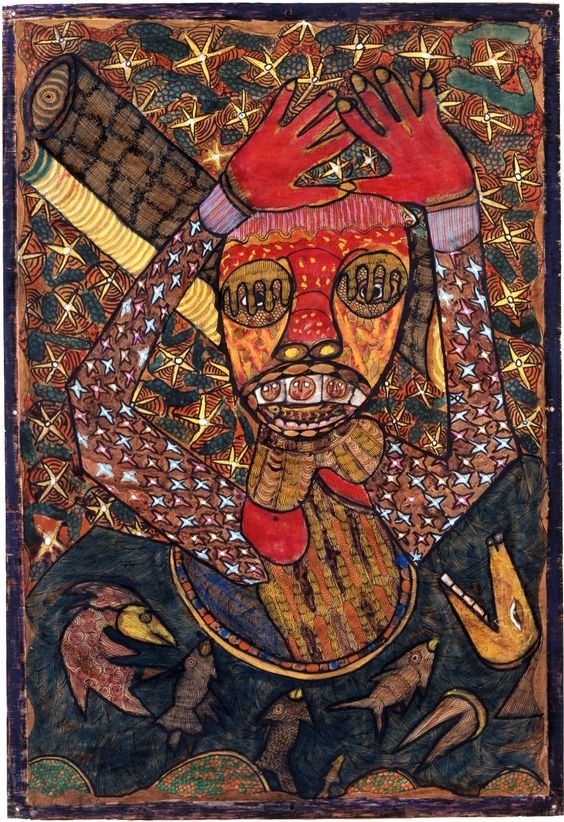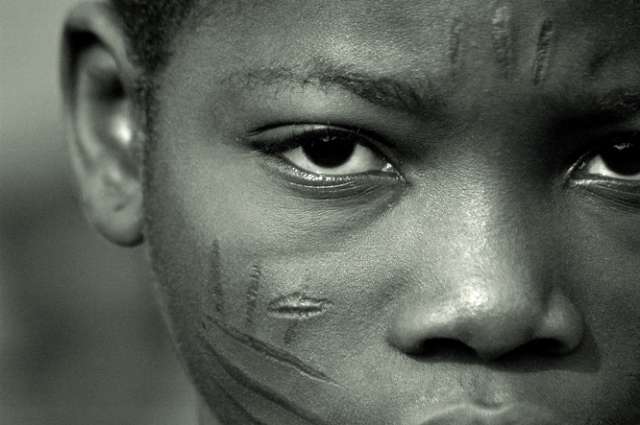ABIKU (spirit of a child who dies young)
Abiku refers to the spirits of children who die before reaching puberty; a child who dies before twelve years of age being called an Abiku, and the spirit, or spirits, who caused the death being also called Abiku.

Not only is an abiku a spirit of a child who dies young, the belief is that the spirit returns to the same mother multiple times to be reborn multiple times.
It is the belief that the spirit does not ever plan to "stay put in life" so it is "indifferent to the plight of its mother and her grief."
The spirits themselves are believed to live in trees, especially the iroko, baobab and silk-cotton species...
Ok, before we go further, lets consider a poem by "John Pepper Clerk titled ABIKU
*****POEM*****
Coming and going these several seasons,
Do stay out on the baobab tree,
Follow where you please your kindred spirits
If indoors is not enough for you.
True, it leaks through the thatch
When floods brim the banks,
And the bats and the owls
Often tear in at night through the eaves,
And at harmattan, the bamboo walls
Are ready tinder for the fire
That dries the fresh fish up on the rack.
Still, it’s been the healthy stock
To several fingers, to many more will be
Who reach to the sun.
No longer then bestride the threshold
But step in and stay
For good. We know the knife scars
Serrating down your back and front
Like beak of the sword-fish,
And both your ears, notched
As a bondsman to this house,
Are all relics of your first comings.
Then step in, step in and stay
For her body is tired,
Tired, her milk going sour
Where many more mouths gladden the heart.

Ok, according to this poem, The title is a store of meaning for the poem itself since it gives us understanding of many of the sentences we will encounter in the poem. The word "Abiku" is Yoruba word for ‘spirit child'. It refers to a child who must die and repeatedly be reborn again and again. So, Clark is talking to one of these Abiku.
The poem opens by Clark sounding a denouncement to this Abiku who probably has just been reborn, for ‘coming and going these several seasons’
(line 1) to mean that he gets born, and when the family thinks that he is here to stay, he dies. And he does it several times so that Clark seems so fed up as to tell him to ‘stay out on the baobab tree’
(line 2). In Ghanaian cultural tradition and I should suppose same for Nigerian too, the baobab tree is suspected to be the meeting place of all manner of spirits, witches and wizards who work at night. This is because the tree is usually huge, grows tall and has thick shrubbery that gives it a mystical look especially at night. By asking Abiku to stay out on the baobab tree, Clark is asking him to stay in the spirit world and not be reborn.
In the third line, Clark emphasises this by asking Abiku to ‘follow’ where he pleases his ‘kindred spirits’, which gives a sense that Abiku keeps coming and going from a community of like-minded spirits. This should be so, as Clark says, if ‘indoors is not enough’ for Abiku
(line 4). Indoors refers to normal life among men when Abiku brings joy at birth, only to bring sorrow at death soon after.
Clark goes on to explain the modest conditions in which they live, if perhaps that is what keeps Abiku going away. He confesses that it ‘leaks through the thatch’
(line 5), a roof of grass and straw used as matting for a poor home built usually of clay, when it rains till ‘floods brim the banks’
(line 6). At night also, bats and owls tear through the eaves
(lines 7-8), making sleep difficult. Then when the dry harmattan of the West African dry season comes, the bamboo support of the house is torn down to make fires on which the poor fish caught for the household is dried up on the rack
(line 9-11). Maybe Abiku keeps going because he is born into a poor home. Clark makes this excuse and still insists that Abiku should stay out nevertheless because regardless of how poor they are, the house is the ‘healthy stock’
(line 12) to many more people who are born and stay, and others more who ‘reach to the sun’
(line 13). I will translate this reaching to the sun to mean that they grow up, each growing taller bringing them vertically closer to the sun. Abiku never stays long enough to grow up.
Clark continues that Abiku should make up his mind, no longer should he ‘bestride the threshold’
(line 14), meaning he should no longer stay with one foot indoors and the other out on the baobab tree; an indecision between life and death, this world and the other, ‘but step in and stay. For good’
(line 15-16). Henceforth, Clark mentions a few things we will need to understand by understanding the culture of Yoruba.
When an Abiku comes and goes a couple of times, a frustrated family gives the Abiku scars at birth so that being now made ugly, it will displease the gods and spirits to have him return to the spirit world. This makes the child stay alive and end the sorrow of the family that is burdened to bear that child over and over. Clark says that they can see and ‘know the knife scars’

(line 16) running ‘down [his] back and front’
(line 17), ‘like beak of the sword-fish’
(line 18). They have made their mark on him so that when he has now been reincarnated with those scars, they recognize him ‘as a bondsman to [their] house’
(line 19). In pastoral communities, cattle owners use ear brands and notches to indicate which cattle belong to them. These notches look like huge, coloured earrings on which specific alphabets or even the colour, serve to identify one man’s cattle from his neighbour’s. Clark says that these very evident marks are ‘relics of [Abiku’s] first comings’
(line 20), having also ‘both [his] ears, notched’
(line 21). They are not mistaken; they know him as the one.
Finally, Clark tries to convince Abiku to ‘step in, step in and stay’
(line 22), for the woman who bears him is now ‘tired’
(line 22) of his many reincarnations and so tired that her milk now is ‘going sour’
(line 23). This souring only happens to milk that has grown old and we will assume this to mean that the woman is now growing too old to keep up with Abiku’s treachery and may no longer have a strong body to bear him. Clark tries to make it not sound so bad, by saying that it is with this same milk that ‘many more mouths’
(line 23), presumably of those other people who stay and ‘reach to the sun’, have ‘gladden[ed] the heart
(line 23). Which heart? The hearts of the family which have not hurt because these other people lived on and also the hearts of these ones who lived on to gladden themselves with the milk of this woman’s breast!
You can follow me @ambmicheal for more
Kindly upvote, comment and resteem
Thank you..
Great work
Your poem is a true representation of an act of humanity 'TO DISTINCT ".
Keep it original @ambmichael
Thanks much
Wonderful piece, this should be included in our social studies textbook books lolzzz..
Lmfao.... Sight you bro
Abiku the best poem I read in my Literature class. Fun memories.
It is really...
The black burster, kip it up bro
Thanks so much
Thanks for sharing. Good job :) upvoted!
Here's my recent post. Please have time to read. Upvotes are highly appreciated. Thanks!
https://steemit.com/poetry/@athenabree08/great-pretender
Done... Good job
Wow, you've actually interpreted those what the poem conveys. This is a very nice poem with a very deep meaning embedded in it. This is a great post and is worth the visit. :) I hope to see more, I'm following you.
Thanks soooo much
Your poem deserves it. :) You're welcome! :)
Hi! I'm happy to choose this post for my "Care To Read "Crossword Puzzle Contest No. 2. I'm posting a link to this post in my posts related to this contest. I wish it will send some more traffic to your post.
Thank you for writing awesome content!
Thanks so much
Wow that is amazing thank you for sharing
Your Insight on the spirit children and the poem. I would love to learn anything else you have to share. Abiku that also include the child who dies before being born?😢
Nope, not the child who dies before being born.... The child dies after birth, and be rebirth several other times
Thank you so much for responding
Do find this fascinating this fascinating.
@originalworks
The @OriginalWorks bot has determined this post by @ambmicheal to be original material and upvoted it!
To call @OriginalWorks, simply reply to any post with @originalworks or !originalworks in your message!
To nominate this post for the daily RESTEEM contest, upvote this comment!
For more information, Click Here!